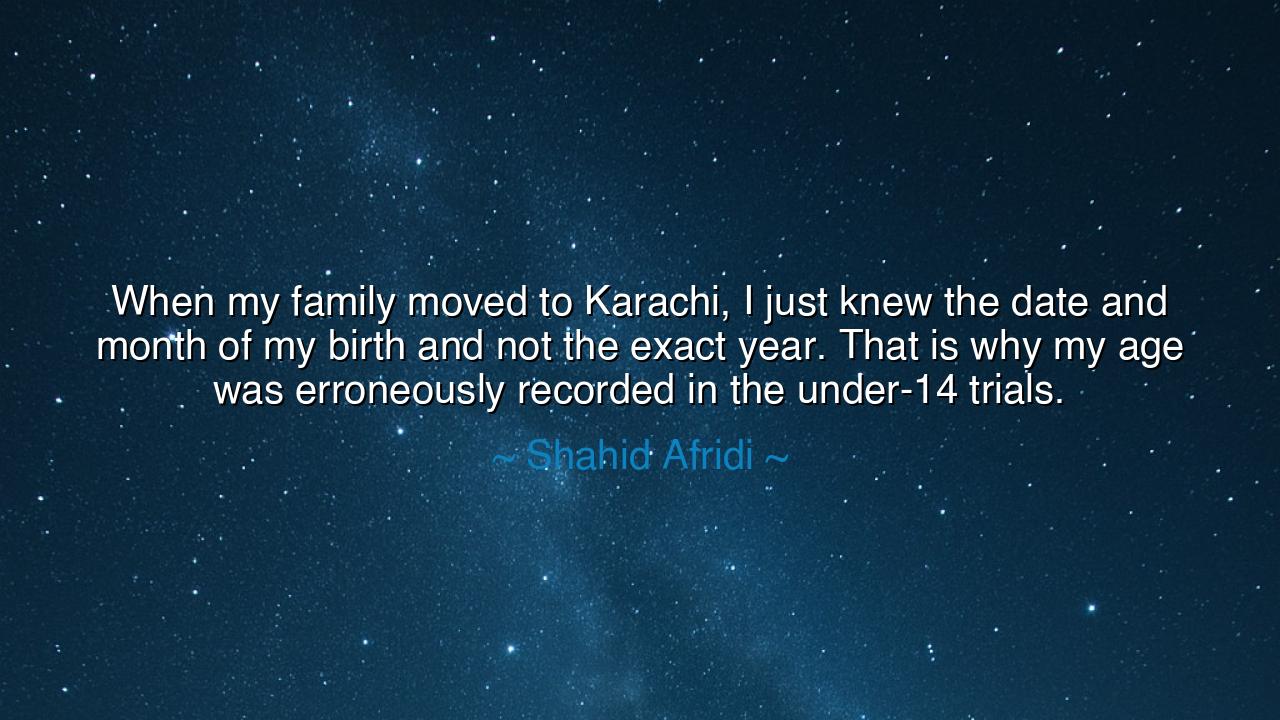
When my family moved to Karachi, I just knew the date and month
When my family moved to Karachi, I just knew the date and month of my birth and not the exact year. That is why my age was erroneously recorded in the under-14 trials.






Harken, O children of the future, to the words of Shahid Afridi, a man whose journey through life reflects the truth of how time, identity, and fate often intertwine in unexpected ways. He spoke of an experience, saying, "When my family moved to Karachi, I just knew the date and month of my birth and not the exact year. That is why my age was erroneously recorded in the under-14 trials." These words offer us a glimpse into the complexities of identity—how something as simple as birth can hold such significance in the course of our lives, yet sometimes, the numbers attached to it are uncertain, blurry, and perhaps even irrelevant in the face of a greater journey.
In the ancient world, the notion of age and birth was often closely tied to the rhythms of nature, to the seasons and cycles that defined the lives of peoples across the earth. The Greeks, for instance, saw time not as an endless march of years but as a circle—a repetition of the natural world, of the seasons, the sun’s passage across the sky. To them, one's age was less about the exact number of years lived and more about the wisdom accumulated through living in accordance with the natural world. Time was measured by the harvests and movements of the heavens, not by rigid calculations. Similarly, the Romans used the term annus to mean both a year and a cycle, recognizing that time was more about the phases of life than the exact years counted.
In Afridi’s case, the confusion of age represents a moment in his life when external markers of time, like the year of birth, were lost in the chaos of change. When his family moved to Karachi, he was disconnected from the usual rites and records of the world that keep time in neat boxes—his birth year was uncertain, not because of negligence, but because life had carried him in ways that placed no emphasis on the details of his past. In this, we see a deeper lesson: that life’s path is often marked by uncertainty and adaptability. The exact moment of birth or the exact date of an event may not matter in the grand scheme of a life lived with purpose. What matters is how one navigates the journey, not the precise numbers that attempt to define it.
Think, O wise ones, of the great Alexander the Great, whose birth date was surrounded by mystery and myth. His early years were clouded in uncertainty, with his exact age and even the day of his birth unclear. Yet, this did not define his destiny. Instead, his greatness was measured by the accomplishments he achieved, by the way he shaped history, not by the year in which he was born. His age was less important than the power of his ambition, the clarity of his vision, and the courage with which he led his armies across the world. This demonstrates that success is not tied to the exact calculation of age but to the purpose that drives the individual to act.
Likewise, Afridi’s story reminds us that, in life, the markers by which we define success are often self-imposed. His age was not a reflection of his abilities or potential, but rather a technicality, one that did not define his journey as a cricketer. Afridi’s story of how an erroneous age recorded him in the under-14 trials speaks to a greater truth: life’s progress is not always linear, nor does it follow the neatly organized paths we set for it. The opportunities we encounter may not always align with the way society expects us to measure time, but that does not diminish our ability to forge a path toward greatness.
There is, too, the reminder that identity is not solely built upon the rigid structures of time, but upon actions and choices. Just as Afridi found himself in a moment where his age was unknown and his future uncertain, each of us faces moments in life when we must move forward with confidence, even when we don’t have all the answers. The journey ahead is often marked by change—both external and internal—and we must learn to embrace these shifts. Just as the uncertainty of his birth year did not prevent Afridi from achieving greatness, so too should we learn not to be constrained by external labels or arbitrary markers of success.
Therefore, O children of the future, take this lesson to heart: your journey is not defined by the exact numbers that try to confine it—whether those are the years of your life, the dates you celebrate, or the achievements you strive for. Life is about how you navigate the road you are on, how you adapt to the world around you, and how you rise above the obstacles that seem to define you. In times of uncertainty, embrace the unknown and continue to forge ahead with purpose, for it is not the precision of the dates on your calendar that matter, but the quality of the life you create, the goals you pursue, and the legacy you leave behind. In this way, you will find that your true age is not a measure of time, but of the wisdom you accumulate along the way.






AAdministratorAdministrator
Welcome, honored guests. Please leave a comment, we will respond soon